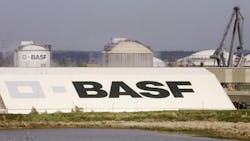BASF Is Wise to Keep a Seat at the Bargaining Table
Monsanto's reported pivot toward a possible deal with BASF could be just a ploy to get even more money out of Bayer. But BASF stands to benefit by playing along and seeing if it can get something for itself in the process.
The world's largest seed company is said to have revived talks with BASF over a possible transaction whereby Monsanto would issue stock to the German company in exchange for its agrochemicals business. Such a deal would allow Monsanto to achieve its long-sought goal of adding fungicides and herbicides to its seed portfolio -- an appealing alternative if the U.S. company can't negotiate a high enough price out of its would-be acquirer Bayer. (Indeed, Bayer on Thursday said it raised its offer to $125 a share, still below the $140 that some analysts have cited as an appropriate price.)
So there's logic in a BASF deal for Monsanto. And for BASF?
The $73 billion company would be parting with its most profitable division and one that many analysts see as an eventual growth opportunity. But at the same time, BASF's agriculture solutions division is the smallest of its major businesses and will rank behind the operations of many of its major rivals, especially after Dow and DuPont merge and Syngenta completes its sale to ChemChina.
BASF has reportedly looked at jumping into just about every agricultural deal possibility that has come about -- including weighing bids for DuPont, Syngenta and Monsanto. CEO Kurt Bock has balked at the high valuations being paid, though, choosing instead to pursue smaller, more reasonably priced takeovers in other parts of the chemical sector, such as the $3.2 billion purchase of Albemarle's surface treatment business. Waiting on the sidelines has its benefits; just look at what Bayer's stock price did when news broke that it was pursuing Monsanto. But standing pat for too long -- particularly if a Bayer-Monsanto combination comes together -- could put BASF in a very tough spot competitively.
In that light, grabbing one of those high agrochemical valuations for itself could be a good move for BASF. The stock payment that's being proposed would allow the company to benefit in any future upside that's created from a combination and stay relevant in the rapidly consolidating agricultural world. It's worth noting that this isn't the first time BASF has considered a deal structure that would give it an equity stake in a bigger company. One plan that was under discussion with Syngenta would have seen BASF contributing its agricultural business plus some cash to the Swiss pesticide maker in exchange for a majority stake in the combined entity.
Who knows, down the road, BASF could even use its Monsanto equity stake as leverage to stage a full-scale takeover of the seed company. Low interest rates (with no increase in sight) have helped inflate M&A multiples, but that's not going to last forever. A more normalized environment would help BASF pursue big deals without running afoul of its longer-term return goals, notes Jefferies' analyst Laurence Alexander.
BASF shareholders seem to like the idea, sending the stock up as much as 4.3 percent on Thursday.
Price could be the sticking point. Monsanto's stock has been elevated because of Bayer's takeover bid so determining the appropriate exchange ratio will be tricky. Syngenta commanded about 17 times forward Ebitda in its $46 billion sale to ChemChina, while Bayer's initial bid for Monsanto worked out to about 16 times the company's projected 2016 profit. BASF shareholders may rightly want to see a valuation in that range as well, which would translate into a purchase price of around $24 billion. But Monsanto risks diluting its earnings -- or at best breaking even -- by paying up that much, which makes a deal a harder sell when shareholders are eyeing an all-cash takeover premium from Bayer.
-Brooke Sutherland
This column does not necessarily reflect the opinion of Bloomberg LP and its owners.
